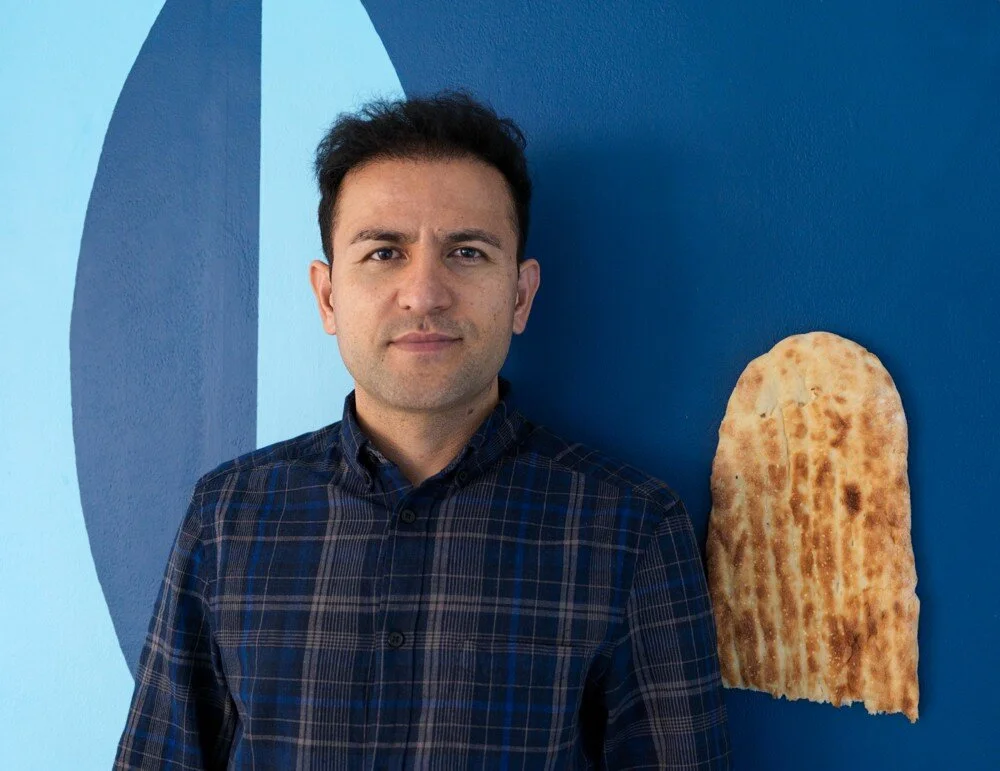Image: Elyas ALAVI, Naan/Bread, video still, Middle Eastern bread, LED light, acrylic on wall. Installation view, We die so that, Nexus Arts, 2017. Photo: Grant Hancock.
Elyas Alavi
by Virginia Rigby
Commissioned by Samstag Museum of Art, University of South Australia, for the 2019 Samstag Scholarships
A lyrical poetic sensibility weaves throughout Elyas Alavi’s diverse practice. Across painting, performance, video, writing, installation and collaborative community practices, his works tantalise with suggestion in a transcultural dialogue that resists conventional boundaries of place and identity.
Alavi has the lived experience of a refugee, bringing with it all of the history of aching loss, displacement, memories of everyday violence, and the challenges of navigating language and cultural differences. The weight of these experiences is balanced with an assured knowledge of his cultural and family background as well as a deep sense of the value of art-making as a contribution to his new home in Australia.
A member of the Hazara people, most of Alavi’s family were displaced from Afghanistan’s Daikundi Provenance to Iran when he was a small boy. His teenage years were spent on the rough outskirts of the city, but within that ghetto he recalls Thursday-evening gatherings when people would meet to recite poetry, each crafting not only their words but also their style and body language. Although he grew up drawing, Alavi describes poetry as “accidentally” becoming his primary art form—no doubt influenced by his father, who was a teacher and lover of books—, so much so that he went on to win poetry awards in his late teens.
Leaving his parents and siblings behind, Alavi immigrated as a refugee to Australia in 2007 and became a citizen in 2011. He initially resisted the idea of studying to become an artist but was encouraged to pursue this direction by Adelaide-based senior artist Hossein Valamanesh, who shared a similar background to Alavi and provided him with advice and support.
Alavi may be safe in Australia now, but his work is conceptually unflinching. His 2016 project Halal questioned the Islamic notion of the male body as ‘halal’ (correct and accepted) and the female body as ‘haram’ (forbidden).
He returned to Afghanistan in 2013 after an absence of 23 years to see his family and to make work, and revisited his home country in July 2016. It was during this second trip that he became caught up amongst the deadliest bombing to take place in Kabul since 2001. His video work of this experience, We Die So That (2017), begins by documenting a peaceful civic protest that suddenly turns horrifically violent. Alavi continues to film during the chaos, and finds a bloodied identity card for a man from his home town in the Khedir district home village. The video then takes on something of the genre of the conventional road trip, this time with a macabre urgency as the artist begins searching the city hospitals and morgue for the man’s body. He then travels to [name of the village] where he is able to pay his respects and speak with the dead man’s grieving widow and parents; such intimate empathy is rarely seen in conventional media reports of Middle East conflict.
Despite these powerful themes Alavi’s work retains a light touch and at times a subtle humour that reflects resilience in the face of trauma. He finds himself drawn to the aesthetics of butcher shops and the unexpected poetics of neon signage, the geometric patterns on a football jersey and a prayer rug.
Irony is layered in a contemporary reading of ancient cultural references in Alavi’s most recent work Bread, Salt, Pomegranate, Nafas (2018). Instead of grenades, a suicide vest is loaded with gleaming red pomegranates. (It’s well known to locals that the most delicious variety of this fruit comes from the ISIS stronghold of Kandahar.) Salt—one of the Middle East’s most precious commodities—pours out from one of the pockets. In a region where respect is bound in the saying “I have had your salt” (“I have experienced your hospitality”), this gesture is one of profound wastage.
The meanings of these works are intentionally visceral and slightly mysterious. With their tender insights, however, they become a unique artistic bridge of understanding into of one of the most complex conflicts of our time and of the associated impacts on lives now spread around the world.
— Virginia Rigney is a curator and arts writer in Canberra, Australian Capital Territory.
First published by Samstag Museum of Art, University of South Australia: unisa.edu.au/samstag

